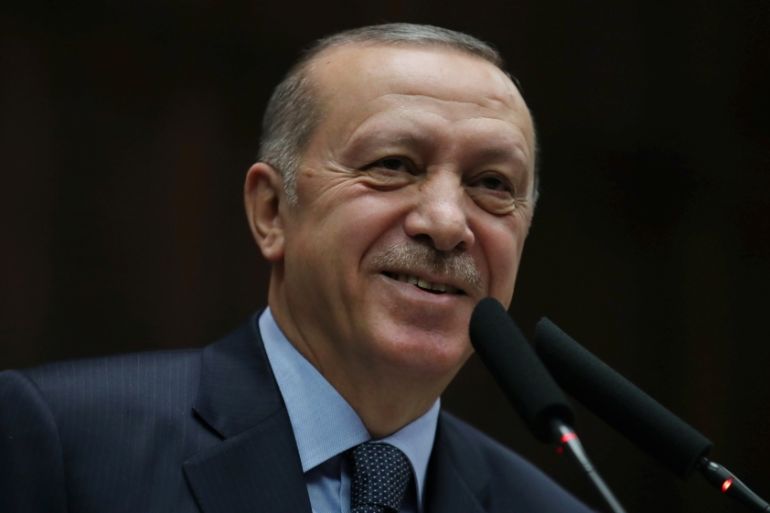Erdogan vows to strengthen cooperation with Qatar
Turkish president vows to strengthen relations in various sectors including defence, trade, tourism and energy.

Turkish President Recep Tayyip Erdogan has said Turkey’s cooperation with Qatar will continue to strengthen in various sectors including defence, trade, tourism and energy.
“We have never forgotten and will never forget the solidarity shown to our country by our Qatari brothers on nearly all issues – from the July 15 coup attempt to the attacks in August on [our] exchange rates [Turkish lira],” Erdogan said on Sunday, speaking at a meeting of automotive manufacturer BMC in Turkey’s northwestern province of Sakarya.
Keep reading
list of 4 itemsTurkish opposition wins major cities in local elections
What shapes Turkey’s municipal elections?
Turkey offers to host Russia-Ukraine peace talks as Erdogan hosts Zelenskyy
Erdogan underlined that Turkey will continue to reduce foreign dependence in its defence industry, which he said had more than halved its foreign dependence from 80 percent in 2002 to 35 percent at present.
“Turkey’s military capacity and economic, political and diplomatic capabilities must be robust,” he said, adding that the deterrence of its defence sector had to be “particularly” high.
During times of crisis, Qatar and Turkey have developed strategic relationships at political, economic and military levels.
In August 2018, Sheikh Tamim bin Hamad Al Thani pledged to invest $15bn in Turkey, which had been struggling with a currency crisis that saw the lira fall by 45 percent against the US dollar.
“We stand by the brothers in Turkey that have stood with the issues of the Muslim world and with Qatar,” Sheikh Tamim said in a tweet at the time.
In 2017, Qatar’s Chamber of Commerce Vice Chairman Mohamed bin Twar said that Qatar’s investment in Turkey exceeded $20bn, the second highest by any country.
Support during Gulf crisis
In May 2017, Saudi Arabia, the United Arab Emirates (UAE), Bahrain and Egypt severed diplomatic and transportation links with Qatar, accusing it of sponsoring “terrorism”, a charge that Doha denies.
Since then, the Saudi-led bloc has isolated Doha diplomatically and economically.
|
|
On June 7, 2017, just two days after the start of the Gulf crisis, Turkey’s parliament ratified two earlier agreements allowing Turkish troops to be deployed in Qatar and another approving an accord between the two countries on military training cooperation in order to maintain security and stability in Qatar.
Five armoured vehicles arrived in Doha on June 18 with plans to keep a brigade in the Gulf country.
The blockading countries have set the closure of the Turkish base in Qatar, which can accommodate up to 5,000 soldiers as one of 13 conditions to restore relations with Doha.
When Saudi Arabia closed Qatar’s only land border, it blocked many vital imports from reaching Qatar, including basic food supplies. To avoid potential food shortages, less than 48 hours after the start of the blockade, Turkey sent cargo planes full of milk, yoghurt, and poultry.
Turkish exports to Qatar increased by 90 percent in the first four months of the blockade, according to statistics released by Turkey’s Aegean Exporters’ Association.
Ending the rift
US Secretary of State Mike Pompeo also hailed Sunday what he called a “strategic partnership” between the US and Qatar.
At a press conference in Doha, he called on Qatar and other Gulf countries to end the political rift.
|
|
Pompeo is in Qatar as part of a nine-nation trip to the Middle East aimed at allaying regional allies’ concerns about US commitments to them.
“Our strategic partnership spans many areas and continues to grow,” Pompeo said at Doha’s US-Qatari strategic dialogue forum.
Qatar is home to Al Udeid airbase, the regional headquarters of the US Central Command. The base has served as a key launching pad for a US-led coalition fighting the Islamic State of Iraq and the Levant (ISIL, also known as ISIS).
Pompeo pushed for GCC unity, as the US seeks to build a solid alliance against Iran.
“Disputes between countries that have a shared objective are never helpful,” he said.